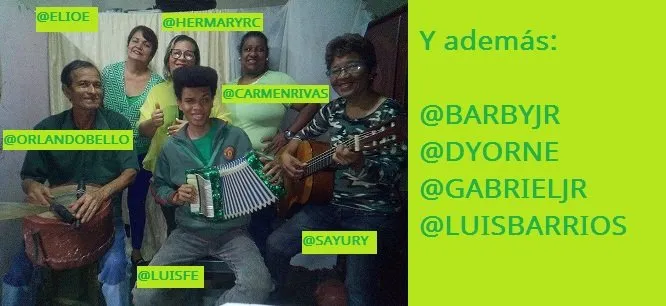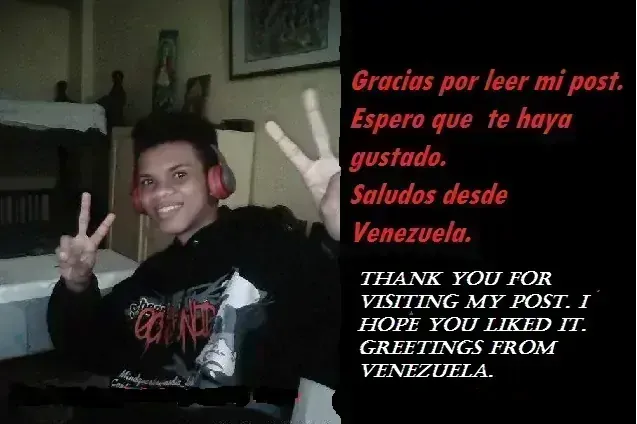
Nuestro reciente Artista Destacado @bertrayo nos propone traer esta semana a la comunidad temas tradicionales. Investigando me encuentro que tradición es un conocimiento práctico o teórico que se transmite de generación en generación. Por eso quise traerles la canción "El Pájaro Chogüí" ya que la misma se basa en una leyenda de la etnia Guaraní, aborígenes que en la época precolombina poblaban algunas zonas de lo que ahora son las repúblicas de Paraguay, Argentina, Brasil , Bolivia, Argentina y Uruguay.
Esta leyenda se ha ido transmitiendo de generación en generación - con algunas variantes - en la etnia, y,además, es un canto tradicional acá en Venezuela donde se acostumbra escenificarlo en los colegios, en los actos culturales, siendo favorito de niños y adultos por su agradable música y por la historia mágica que narra.
Esta semana, por compromisos de estudio, no me fue posible estar presente el día de grabación con el resto de mis compañeros de la agrupación,así que debí interpretar mi participación en casa sin el apoyo de otros instrumentos.
Este video, es otra producción de la Agrupación Musical "Venezuelan Power" (Nombre ideado por @fernanblog. Por sugerencia suya y de nuestro estimado @jesuslnrs estuvimos buscando un nombre y entre todos los sugeridos fue este el que màs nos gustó)
En este video conté con el apoyo de:
@gabrieljr Soporte técnico
@hermaryrc Asesoría de imagen
@sayury Grabación

Our recent Spotlight Artist @bertrayo proposes us to bring traditional themes to the community this week. Investigating I find that tradition is a practical or theoretical knowledge that is transmitted from generation to generation. That is why I wanted to bring you the song "El Pájaro Chogüí" (Chogüi Bird) since it is based on a legend of the Guaraní ethnic group, aborigines who inhabited some areas of what are now the republics of Paraguay, Argentina, Brazil, Bolivia, Argentina and Uruguay.
This legend has been transmitted from generation to generation - with some variations - in the ethnic group, and, in addition, it is a traditional song here in Venezuela where it is customary to perform it in schools, in cultural events, being a favorite of children and adults for its adorableness. music and for the magical story that it narrates.
This week, due to study commitments, it was not possible for me to be present on the recording day with the rest of my groupmates, so I had to interpret my participation at home without the support of other instruments.
This video is another production of the Musical Group "Venezuelan Power" (Name devised by @fernanblog. At his suggestion and our esteemed @jesuslnrs we were looking for a name and among all those suggested, this was the one we liked the most)
In this video I had the support of:
@gabrieljr Technical support
@hermaryrc Image consultancy
@sayury Recording

Comparto con ustedes un video que nos lleva a generaciones anteriores, cuandola televisión era en blanco y negro.En el mismo podrán escuchar a Néstor Zavarce, cantante y actor venezolano uno de los más emblemáticos intérpretes de esta canción - leyenda.

I share with you a video that takes us to previous generations, when television was in black and white. In it you will be able to listen to Néstor Zavarce, singer and Venezuelan actor one of the most emblematic interpreters of this song - legend.

Cuenta la leyenda que en un árbol
C D7
se encontraba encaramado un indiecito guaraní,
que sobresaltado por un grito de su madre
G
perdió apoyo, y cayendo se murió.
Em
Y que entre los brazos maternales
G G7 C
por extraño sortilegio en chogüí se convirtió.
Chogüí, chogüí, chogüí, chogüí,
G
cantando está, mirando allá,
D7 G G7
llorando y volando se alejó.
C
Chogüí, chogüí, chogüí, chogüí,
G
que lindo va, que lindo es
D7 G
perdiéndose en cielo guaraní.
G Em
Y desde aquel día se recuerda al indiecito
C D7
cuando se oye como un eco a lo chogüí,
ese canto alegre y bullanguero
G
del gracioso naranjero que repica en su cantar.
Em
Salta y picotea las naranjas
G G7 C
que es su fruta preferida, repitiendo sin cesar.
Chogüí, chogüí, chogüí, chogüí,
G
cantando está, mirando allá,
D7 G G7
llorando y volando se alejó.
C
Chogüí, chogüí, chogüí, chogüí,
G
que lindo va, que lindo es
D7 G
perdiéndose en cielo guaraní.
Fuente de la letra en castellano

Legend tells us that in a tree
a Guarani Indian was perched,
that startled by a cry from his mother
he lost support, and falling to his death
And that between the maternal arms
by strange spell he became chogüí.
Chogüí, chogüí, chogüí, chogüí,
it is singing, looking there,
crying and flying away.
Chogüí, chogüí, chogüí, chogüí,
how beautiful it is, how beautiful it is
getting lost in the Guarani sky.
And since that day the little Indian is remembered
when it is heard like an echo to the chogüí,
that happy and boisterous song
of the funny orange tree eating that chimes in its singing.
Jump and peck at the oranges
which is its favorite fruit, repeating endlessly.
Chogüí, chogüí, chogüí, chogüí
it is singing, looking there,
crying and flying away.
Chogüí, chogüí, chogüí, chogüí,
how beautiful it is, how beautiful it is
getting lost in the Guarani sky.
NOTA: Song translated from Spanish to English with Google translator.

Compartimos nuestra música con ustedes desde Villa de Cura, estado Aragua, Venezuela / We share our music with you from Villa de Cura, Aragua state, Venezuela

